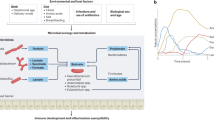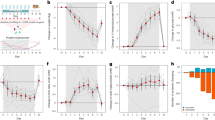Abstract
Objectives:
To determine the effect of low-dose weekly supplementation with iron, zinc or both on growth of infants from 6 to 12 months of age.
Subjects/Methods:
A total of 645 breastfed infants age 6 months who were not severely anemic (Hb⩾90 g l−1) or severely malnourished (weight-for-age ⩾60% median) were randomized to receive 20 mg iron and 1 mg riboflavin; 20 mg zinc and 1 mg riboflavin; 20 mg iron, 20 mg zinc and 1 mg riboflavin; or riboflavin alone (control) weekly for 6 months.
Results:
Baseline characteristics were similar among the four supplementation groups. Weight, length and mid-upper arm circumference were assessed at baseline, 8, 10 and 12 months of age. There was no interaction of iron and zinc when given in a combined supplement on either weight or length (P>0.05). There were no effects of either iron or zinc on the rate of length or weight gain for all infants or when stratified by baseline Hb concentration.
Conclusions:
Weekly supplementation of 20 mg Fe, 20 mg Zn, or both does not benefit growth among infants 6–12 months of age in rural Bangladesh, a region with high rates of anemia and zinc deficiency.
This is a preview of subscription content, access via your institution
Access options
Subscribe to this journal
Receive 12 print issues and online access
$259.00 per year
only $21.58 per issue
Buy this article
- Purchase on Springer Link
- Instant access to full article PDF
Prices may be subject to local taxes which are calculated during checkout
Similar content being viewed by others
References
Allen LH (1994). Nutritional influences on linear growth: a general review. Eur J Clin Nutr 48, S75–S89.
Angeles IT, Schultink WJ, Matulessi P, Gross R, Sastroamidjojo S (1993). Decreased rate of stunting among anemic Indonesian preschool children through iron supplementation. Am J Clin Nutr 58, 339–342.
Baqui AH, Walker CL, Zaman K, El Arifeen S, Chowdhury HR, Wahed MA et al. (2005). Weekly iron supplementation does not block increases in serum zinc due to weekly zinc supplementation in Bangladeshi infants. J Nutr 135, 2187–2191.
Baqui AH, Zaman K, Persson LA, El Arifeen S, Yunus M, Begum N et al. (2003). Simultaneous weekly supplementation of iron and zinc is associated with lower morbidity due to diarrhea and acute lower respiratory infection in Bangladeshi infants. J Nutr 133, 4150–4157.
Berger J, Ninh NX, Khan NC, Nhien NV, Lien DK, Trung NQ et al. (2006). Efficacy of combined iron and zinc supplementation on micronutrient status and growth in Vietnamese infants. Eur J Clin Nutr 60, 443–454.
Black MM, Baqui AH, Zaman K, Ake Persson L, El Arifeen S, Le K et al. (2004). Iron and zinc supplementation promote motor development and exploratory behavior among Bangladeshi infants. Am J Clin Nutr 80, 903–910.
Brooks WA, Santosham M, Naheed A, Goswami D, Wahed MA, Diener-West M et al. (2005). Effect of weekly zinc supplements on incidence of pneumonia and diarrhoea in children younger than 2 years in an urban, low-income population in Bangladesh: randomised controlled trial. Lancet 366, 999–1004.
Brown KH, Dewey KG, Allen LH (1998). Complementary feeding of young children in developing countries. In:World Health Organization: Geneva.
Brown KH, Peerson JM, Rivera J, Allen LH (2002). Effect of supplemental zinc on the growth and serum zinc concentrations of prepubertal children: a meta-analysis of randomized controlled trials. Am J Clin Nutr 75, 1062–1071.
Dijkhuizen MA, Wieringa FT, West CE, Martuti S, Muhilal (2001). Effects of iron and zinc supplementation in Indonesian infants on micronutrient status and growth. J Nutr 131, 2860–2865.
Iannotti LL, Tielsch JM, Black MM, Black RE (2006). Iron supplementation in early childhood: health benefits and risks. Am J Clin Nutr 84, 1261–1276.
Kramer MS, Kakuma R (2002). The Optimal Duration of Exclusive Breastfeeding In: World Health Organization: Geneva.
Lind T, Lonnerdal B, Stenlund H, Gamayanti IL, Ismail D, Seswandhana R et al. (2004). A community-based randomized controlled trial of iron and zinc supplementation in Indonesian infants: effects of growth and development. Am J Clin Nutr 80, 729–736.
Prasad AS, Miale A, Farid Z, Sanstead HH, Schulert AR, Darby WJ (1963). Biochemical studies on dwarfism, hypogonadism and anemia. Arch Internal Med 111, 407–428.
Ramakrishnan U, Aburto N, McCabe G, Martorell R (2004). Multimicronutrient interventions but not vitamin a or iron interventions alone improve child growth: results of 3 meta-analyses. J Nutr 134, 2592–2602.
Sazawal S, Black RE, Ramsan M, Chwaya HM, Stoltzfus RJ, Dutta A et al. (2006). Effects of routine prophylactic supplementation with iron and folic acid on admission to hospital and mortality in preschool children in a high malaria transmission setting: community-based, randomised, placebo-controlled trial. Lancet 367, 133–143.
Smith JC, Makdani D, Hegar A, Rao D, Douglass LW (1999). Vitamin A and zinc supplementation of preschool children. J Am Coll Nutr 18, 213–222.
STATA Corporation (2005). STATA 9.0 Reference Manual. STATA Corporation: College Station, TX.
Stoltzfus R (2001). Defining iron-deficiency anemia in public health terms: a time for reflection. J Nutr 131, 565S–567S.
Wasantwisut E, Winichagoon P, Chitchumroonchokchai C, Yamborisut U, Boonpraderm A, Pongcharoen T et al. (2006). Iron and zinc supplementation improved iron and zinc status, but not physical growth, of apparently healthy, breast-fed infants in rural communities of northeast Thailand. J Nutr 136, 2405–2411.
WHO (1983). Measuring Change in Nutritional Status In: World Health Organization: Geneva.
WHO Multicenter Growth Reference Study Group (2006). WHO Child Growth Standards: Length/Height-for-Age, Weight-for-Age, Weight-for-Length, Weight-for-Height, and Body Mass Index-for-Age: Methods and Development In: World Health Organization: Geneva.
Acknowledgements
This study was possible because of the many families who allowed their children to participate and the dedication of the field and data management staff of the International Centre for Diarrhoeal Diseases Research, Bangladesh. This study was funded by the Nutricia Foundation and the US Agency for International Development (USAID). This paper does not necessarily reflect the views of USAID or the US government.
Author information
Authors and Affiliations
Corresponding author
Additional information
Contributors: AHB and REB designed the study and wrote the initial protocol. AHB, KZ, SEA, NB and MY contributed to the final study design, implemented the study in Bangladesh and ensured the quality of the data. CLFW, AHB, SA, LEC and REB designed the analysis plan, carried out the analysis and wrote the manuscript. All authors reviewed the manuscript and contributed to the final version.
Rights and permissions
About this article
Cite this article
Fischer Walker, C., Baqui, A., Ahmed, S. et al. Low-dose weekly supplementation of iron and/or zinc does not affect growth among Bangladeshi infants. Eur J Clin Nutr 63, 87–92 (2009). https://doi.org/10.1038/sj.ejcn.1602905
Received:
Revised:
Accepted:
Published:
Issue Date:
DOI: https://doi.org/10.1038/sj.ejcn.1602905
Keywords
This article is cited by
-
Zinc Supplementation for Promoting Growth in Children Under 5 years of age in Low- and Middle-income Countries: A Systematic Review
Indian Pediatrics (2019)
-
A rapid, simple questionnaire to assess gastrointestinal symptoms after oral ferrous sulphate supplementation
BMC Gastroenterology (2014)
-
Effect of preventive zinc supplementation on linear growth in children under 5 years of age in developing countries: a meta-analysis of studies for input to the lives saved tool
BMC Public Health (2011)



